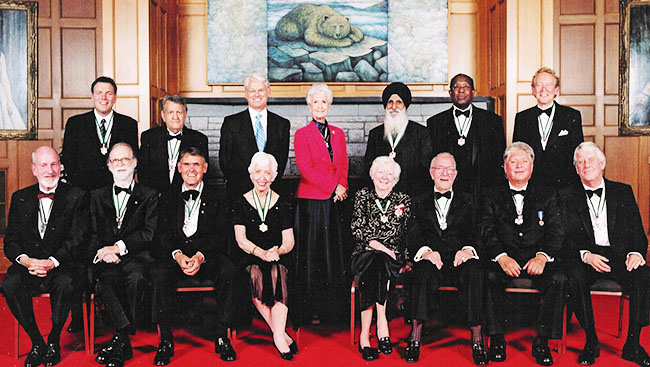You recently received the Prime Minister’s Volunteer Award. Please share that moment.
I was heartened to receive the award in March 2015. The award was in recognition for my accomplishments through long years of selfless service to the society in Canada and beyond its global borders. It was a marvellous moment and a superb achievement of my life. Before practically holding the award, I thanked my Lord and my wonderful mother. I was a cow grazer in my young days. When I got that award, I felt that a poor cow grazer is now receiving the most prestigious award from the PM. This award will encourage me to work more for the benefit of humanity.
You are famously known as the author of the Encyclopaedia of Sikhism on multimedia technology – a first of its kind in the world. Do share insights on this document and your work on it.
The Sikh encyclopaedia was released by the Prime Minster of Canada, Jean Chrétien on December 10, 1996. In all, it took me 16 years to write it. Once a friend of mine discouraged me by saying, “the encyclopaedias are not grown on trees, don’t dream even”. It was a booster for me. When I was working on it, I spent eight hours working for my livelihood and the rest on the encyclopaedia, sleeping for two to three hours a day for years.
I am the first person to use multimedia technology in the field of encyclopaedias. It is a reference tool on Sikh faith, history, culture, heritage and the Sikh way of life. Thousands of digitized and animated pages of text, audio, video and graphics cover information on bettering human life, promoting multiculturalism, mutual harmony, integrity, peace, prosperity and wellbeing of the entire human race.
Having 50,000 pages, it also contains 1,500 paintings and photos. It was created after a lot of research travelling dozens of countries in the world. I am happy that ultimately I was able to pay back to the society at large.
You have also produced and programmed Multimedia Sikh Museums in the world using the Robotic technology. Do talk about the museums.
I set up the first of its kind robotic museum in 2004 in India. I learnt about the basics of the robotic technology from NASA, and I used the technology for the museum settings. It was the first time in the world that anybody used robotic technology in the field of such museums. Visitors can switch to watch, listen and hear whatever is in their mind for hundreds of hours.
I used Punjabi, English, Hindi and French languages in these museums. The museums are an immense tool for promoting multiculturalism, tolerance, mutual harmony, integrity, peace and prosperity in the world. So far I have set up six museums in the world, one is in Canada, and five are in India.
Being an experienced drug addiction counsellor, what are your views on drugs and its ill effects?
It is said that there is no cure for drug use. Every day you have to make up your mind that I should not take drugs. There is need of education, awareness, treatment, counseling and rehabilitation. I have arranged and addressed many seminars, conferences, groups, camps and workshops. It’s not only the drugs, but TV, social media, Internet and smart phones, which though are good technologies, are misused for bad purposes. It takes a short time to get into drugs, but a longer time to get out of it. The problem is always pinching my mind. I think that due to this evil, there are rapes, domestic violence, divorces, separations and breaking of the families. I wish all the governments, societies, religions, medical and cultural groups work towards ending this evil.
Do talk about the classic books you wrote.
I started writing articles, stories and theatre plays for stages in my teens. Then I started writing books on history and religious philosophy, like the life history of Guru Hargobind Ji, life history of Guru Gobind Singh Ji and life history of Guru Angad Dev in English and Punjabi. These are classic books in which I used 65 paintings that I had especially gotten made. Those paintings were prepared in Canada, but used in India. Those books are available throughout the world. The book on history of Guru Angad Dev ji talks about how the Punjabi alphabet was created and modified in the world, giving its proper history.
What does voluntary work mean to you?
Volunteering is my passion. It is a mission of my life which I undertook at very tender years of my life. At the age of 10, my mother took a promise from me that I will do volunteer work my whole life – whether I get education or not. She said it is your duty and it will be your passion, lifestyle and conviction. I started volunteering by cleaning the smelling streets of my village at the age of 10. These days I am not cleaning the smelling streets, but cleaning the smelling societies.
I volunteer for charitable trusts, senior citizen societies, educational institutions and those who are victims of domestic violence, into drugs, forced into flesh trading, victims of rapes, poverty and HIV-AIDS. The money I receive along with the awards, I donate it to the community organizations. I believe that I am made to help others, because I have taken so much from
society. I have to pay it back.
Almost every year I visit Khadur Sahib (Punjab) India, to help thousands of needy students studying in seven schools, two colleges and six professional academies run under the able
guidance of Baba Sewa Singh Kar Sewa Wale. We are training students to become top sports icons, teachers, preachers, professionals, doctors, engineers, police officials and administrators.
Who is your role model?
Almighty Lord is the spirit behind me and my mother is the role model. Everything I do today is due to my mother. She was the power and passion behind me. She was a nice lady, always helping and thinking for the well-being of the community and nation. Whatever I do, my mother is there watching me. I think that I am on a right path.
How do you see the growth of the Indian community in British Columbia?
Our forefathers migrated to this country in search of good pastures. They worked and died for this country and for its prosperity, making it a better one, and we are trying to add more to it. I wish that our new generation works hard to give back what the country and our forefathers have done for them. The Indian community in B.C. is flourishing. Majority of the people are very good and industrious people, hard working and working for the prosperity, well-being, and development of the country.
Having won hundreds of local, national and international awards, how do you feel receiving the honour?
Receiving awards and titles are a boon and gift from God – I got the Order of British Columbia; Good Citizen of the City of Surrey; The Order of Khalsa, Punjab; Queen Elizabeth 11’s ‘Golden’ and ‘Diamond’ Jubilee Medals; and Lifetime Achievement Awards among many others. One important award I got is the Sikh Scholar of the Computer Age from Sri Akal Takhat Sahib Amritsar.
Sometimes I feel very happy. Not that I am getting the award, but because there is someone on this earth to say thank you to me. While working on the encyclopaedia, I couldn’t be helpful and supportive to my wife, but now when I get any of the awards, my wife is with me. I feel happy and great that as per my mission and duty, I am doing something for the happiness, goodness, peace and prosperity of the community as well as the global society. It gives me a boost that I have to work more for the needy and less fortunate.
If you had to sum up you life in a few words, what would you say?
I am the happiest person to volunteer for others. I believe “If we do good unto others, we get good”.




